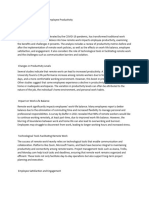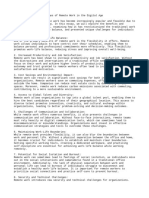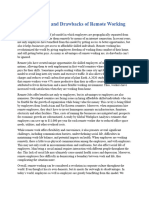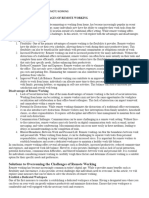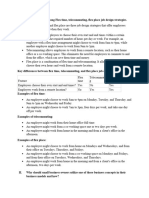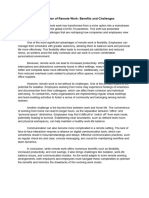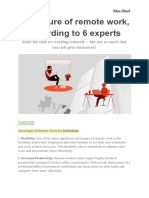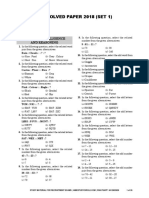1
1
Uploaded by
Hüseyin Sezer YıldırımCopyright:
Available Formats
1
1
Uploaded by
Hüseyin Sezer YıldırımOriginal Description:
Copyright
Available Formats
Share this document
Did you find this document useful?
Is this content inappropriate?
Copyright:
Available Formats
1
1
Uploaded by
Hüseyin Sezer YıldırımCopyright:
Available Formats
The Bene ts and Challenges of Remote Work
Remote work, or telecommuting, has become increasingly popular
in recent years due to advances in technology and changing
attitudes towards work. In this article, we will explore the bene ts
and challenges of remote work for both employees and employers.
Bene ts of Remote Work
One of the main bene ts of remote work is the exibility it provides.
Remote workers can set their own schedules and work from
anywhere with an internet connection, allowing them to better
balance their work and personal lives. This exibility can also result
in increased job satisfaction and employee retention.
Remote work can also save time and money. Without a commute,
remote workers can save money on transportation and reduce the
time and stress associated with commuting. Additionally, remote
work can save employers money on o ce space and other
expenses associated with a traditional workplace.
Another bene t of remote work is the ability to hire and work with
talent from anywhere in the world. This can provide access to a
larger and more diverse pool of workers, and can result in
increased innovation and creativity.
Challenges of Remote Work
While remote work has many bene ts, it also presents several
challenges. One of the main challenges is communication. Remote
workers may feel isolated and disconnected from their team, and
communication can be more di cult without face-to-face
interactions. Employers may need to invest in communication tools
and strategies to ensure that remote workers feel connected and
engaged with their team.
Another challenge is maintaining productivity and accountability.
Without the structure of a traditional workplace, remote workers
may struggle to stay focused and motivated. Employers may need
fi
fi
fi
fi
ffi
fi
ffi
fl
fl
fi
to establish clear expectations and guidelines for remote work, and
may need to monitor and provide feedback on performance.
Finally, remote work can also present challenges for work-life
balance. Without clear boundaries between work and personal
time, remote workers may struggle to disconnect and may
experience burnout.
Conclusion
In conclusion, remote work provides many bene ts for both
employees and employers, including increased exibility, cost
savings, and access to a larger pool of talent. However, it also
presents several challenges, including communication,
productivity, and work-life balance. Employers and employees will
need to work together to overcome these challenges and ensure
the success of remote work arrangements. With the right tools and
strategies in place, remote work can provide a sustainable and
satisfying work environment for both individuals and organizations.
fl
fi
You might also like
- Attachment Log BookDocument30 pagesAttachment Log BookShepherd Nhanga93% (15)
- LISTENING Level 4 PDFDocument160 pagesLISTENING Level 4 PDFعبدالله العنزيNo ratings yet
- Pearsons List of E-BooksDocument336 pagesPearsons List of E-BooksMysterr EverythingNo ratings yet
- Schedule of Loads and Computation SampleDocument5 pagesSchedule of Loads and Computation SampleVhilly JheykNo ratings yet
- Outline 103 3Document5 pagesOutline 103 3api-438507937No ratings yet
- Essay 4Document1 pageEssay 4flitzzgaming3112No ratings yet
- The Benefits and Challenges of Remote Wor1Document2 pagesThe Benefits and Challenges of Remote Wor1AngBagong Barangay SanJuanNo ratings yet
- Blog 3Document2 pagesBlog 3Zaineb MatiullahNo ratings yet
- The Benefits and Drawbacks of Remote WorkDocument1 pageThe Benefits and Drawbacks of Remote Workganji98No ratings yet
- The Benefits and Challenges of Remote WorkDocument1 pageThe Benefits and Challenges of Remote WorkAngBagong Barangay SanJuanNo ratings yet
- The Future of Remote Work: Pros and ConsDocument3 pagesThe Future of Remote Work: Pros and Consyrfgdvb27No ratings yet
- Navigating The Remote Work RevolutionDocument8 pagesNavigating The Remote Work Revolutionsarfrazahmed34357No ratings yet
- Title 2Document2 pagesTitle 2pratheekshasnair002No ratings yet
- The Benefits and Challenges of Remote WorkDocument2 pagesThe Benefits and Challenges of Remote WorkJuan BrattiNo ratings yet
- The Rise of Remote WorkDocument2 pagesThe Rise of Remote WorkbarteksribdNo ratings yet
- Remote Working v2Document3 pagesRemote Working v2simaykoc.skNo ratings yet
- Impact of Remote Work On Productivity and Work-Life BalanceDocument2 pagesImpact of Remote Work On Productivity and Work-Life Balance022MausamNo ratings yet
- 9Document2 pages9Irfan SadabNo ratings yet
- The Impact of Remote Work On Productivity and WorkDocument3 pagesThe Impact of Remote Work On Productivity and WorkXaine PineraNo ratings yet
- 1Document2 pages1mundranehal3834No ratings yet
- Future of Work (Non Economic Topic)Document11 pagesFuture of Work (Non Economic Topic)devang parulekarNo ratings yet
- Remote WorkDocument2 pagesRemote WorkEhab AlMukhaderNo ratings yet
- The Rise of Remote Work: Transforming The Modern WorkplaceDocument1 pageThe Rise of Remote Work: Transforming The Modern WorkplaceDiego VargasNo ratings yet
- A Study Into The Effects of An Increasingly Teleworking SocietyDocument4 pagesA Study Into The Effects of An Increasingly Teleworking Societystonehenge5No ratings yet
- The Evolution of Remote Work Navigating The Future of Flexible EmploymentDocument2 pagesThe Evolution of Remote Work Navigating The Future of Flexible EmploymentAntoine MNo ratings yet
- Four-Day, Flextime and TelecommutingDocument4 pagesFour-Day, Flextime and TelecommutingKryz DukeNo ratings yet
- The Benefits and Challenges of Remote WorkDocument2 pagesThe Benefits and Challenges of Remote WorkerkanaptiNo ratings yet
- The Rise of Remote WorkDocument3 pagesThe Rise of Remote WorkHamd FatimaNo ratings yet
- Remote WorkDocument3 pagesRemote WorkGian John Rey FarroNo ratings yet
- M Usman KhadimDocument2 pagesM Usman KhadimMuhammad Usman KhadimNo ratings yet
- Future of Work (Non Economic Topic)Document11 pagesFuture of Work (Non Economic Topic)devang parulekarNo ratings yet
- Remote Work Pros and ConsDocument1 pageRemote Work Pros and ConssfgNo ratings yet
- The Impact of Remote Work On Employee Performance and WellDocument2 pagesThe Impact of Remote Work On Employee Performance and WellDrazen JovicNo ratings yet
- ListeningDocument4 pagesListeningPham Nhat Linh (K18 HCM)No ratings yet
- Advantages and Disadvantages of Remote WorkingDocument2 pagesAdvantages and Disadvantages of Remote WorkingThoa LeNo ratings yet
- TRS6 Test 2 WritingDocument3 pagesTRS6 Test 2 WritingQuốc AnhNo ratings yet
- TeleworkingDocument6 pagesTeleworkingКарина КолесникNo ratings yet
- Rise of remote workDocument4 pagesRise of remote workJosiah DalisayNo ratings yet
- Homeworking: A Guide To Good PracticeDocument40 pagesHomeworking: A Guide To Good PracticeFelipe Arellano Arellano100% (1)
- Principles of Management ExamDocument7 pagesPrinciples of Management ExamChristoffer LenningsNo ratings yet
- Emerging Trends in HRDocument3 pagesEmerging Trends in HRsumesh.menasseryNo ratings yet
- Impact of Remote and Hybrid WorkDocument7 pagesImpact of Remote and Hybrid Work23pba158ajiteshNo ratings yet
- Remote Work Vs TelecommutingDocument3 pagesRemote Work Vs TelecommutingJaeNo ratings yet
- 2 Advantage and DisadvantageDocument19 pages2 Advantage and DisadvantageMariam MiliNo ratings yet
- 2012 Executive DistributedWorkReportDocument13 pages2012 Executive DistributedWorkReportdesignedanddeliveredNo ratings yet
- 12Document4 pages12Shirin KarwaniNo ratings yet
- Working From HomeDocument4 pagesWorking From Home23521346No ratings yet
- The Advantages and Challenges of Remote WorkDocument3 pagesThe Advantages and Challenges of Remote WorkKane PleaseNo ratings yet
- Q2Document3 pagesQ2hadeerahmedNo ratings yet
- FlexiDocument26 pagesFlexiSakshi SainiNo ratings yet
- Remote Work BenefitsDocument1 pageRemote Work BenefitsAyeshaNo ratings yet
- The Rise of Remote Work and Its Impact On ProductivityDocument3 pagesThe Rise of Remote Work and Its Impact On ProductivityDak DaekNo ratings yet
- Practice Toeic Part 3Document21 pagesPractice Toeic Part 3linh linhNo ratings yet
- Managing Flexible Work ArrangementsDocument12 pagesManaging Flexible Work ArrangementsFabian SunggipNo ratings yet
- The Future of Remote WorkDocument3 pagesThe Future of Remote WorkDak DaekNo ratings yet
- Lektura Prasy ArtykułDocument2 pagesLektura Prasy Artykułsteamimon2No ratings yet
- Virtual WorkplaceDocument2 pagesVirtual WorkplaceJyotsna NandakumarNo ratings yet
- The Economic Perspective of Remote Working Places: July 2020Document13 pagesThe Economic Perspective of Remote Working Places: July 2020Emine MerterNo ratings yet
- Mastering Remote Work: This comprehensive guide empowers you to succeed in the world of remote work.From EverandMastering Remote Work: This comprehensive guide empowers you to succeed in the world of remote work.No ratings yet
- @annisuphere #Idea Sheet - Future of Remote WorkDocument12 pages@annisuphere #Idea Sheet - Future of Remote WorkninaNo ratings yet
- How Flexibility Can Boost Employee Productivity and EngagementDocument7 pagesHow Flexibility Can Boost Employee Productivity and EngagementMayuri AhireNo ratings yet
- Navigating the Career Maze: Achieving Success and Work-Life Balance in the Modern WorkplaceFrom EverandNavigating the Career Maze: Achieving Success and Work-Life Balance in the Modern WorkplaceNo ratings yet
- Work From Anywhere: The Definitive Guide to Remote Job Hunting in 2024-2025From EverandWork From Anywhere: The Definitive Guide to Remote Job Hunting in 2024-2025No ratings yet
- Work Smarter, Not Harder: Techniques for Improving Productivity in the WorkplaceFrom EverandWork Smarter, Not Harder: Techniques for Improving Productivity in the WorkplaceNo ratings yet
- 2Document2 pages2Hüseyin Sezer YıldırımNo ratings yet
- 5Document2 pages5Hüseyin Sezer YıldırımNo ratings yet
- 4Document2 pages4Hüseyin Sezer YıldırımNo ratings yet
- 4Document2 pages4Hüseyin Sezer YıldırımNo ratings yet
- 5Document2 pages5Hüseyin Sezer YıldırımNo ratings yet
- 4Document2 pages4Hüseyin Sezer YıldırımNo ratings yet
- 3Document2 pages3Hüseyin Sezer YıldırımNo ratings yet
- 2Document2 pages2Hüseyin Sezer YıldırımNo ratings yet
- 1Document2 pages1Hüseyin Sezer YıldırımNo ratings yet
- Uteb GP 1 2019Document7 pagesUteb GP 1 2019trustrestina5No ratings yet
- Social Robot Sypehul BolabotDocument6 pagesSocial Robot Sypehul BolabotMada Sanjaya WsNo ratings yet
- 12 1 2 Repository JTDocument244 pages12 1 2 Repository JTAndinetNo ratings yet
- Device Initialization and Password Reset V2 en 20170907Document13 pagesDevice Initialization and Password Reset V2 en 20170907Katie ButlerNo ratings yet
- LO3 Obtain Client FeedbackDocument4 pagesLO3 Obtain Client FeedbackTechalewNo ratings yet
- Malavika 120301102Document5 pagesMalavika 120301102MalavikaNo ratings yet
- Chapter 10: Managing Employee Motivation and Performance The Nature of Motivation Process Perspectives On MotivationDocument7 pagesChapter 10: Managing Employee Motivation and Performance The Nature of Motivation Process Perspectives On MotivationVeronica SangalangNo ratings yet
- 67CDocument16 pages67CTEJASH INGALE77% (13)
- Facial Expression Based Music Recommendation SystemDocument10 pagesFacial Expression Based Music Recommendation SystemIJARSCT JournalNo ratings yet
- Advanced Product Quality Planning 2 Edition: Changes SummaryDocument18 pagesAdvanced Product Quality Planning 2 Edition: Changes SummaryjerobuNo ratings yet
- 1 - THE MASTERS OF DEFENSE Ca. 1530-1617Document23 pages1 - THE MASTERS OF DEFENSE Ca. 1530-1617Alan Fernando Rendon GutierrezNo ratings yet
- Basic Grammar 1Document10 pagesBasic Grammar 1Jeliza EscalañaNo ratings yet
- Unit 2 Health JournalismDocument14 pagesUnit 2 Health JournalismPela Kqbcgrla100% (1)
- QP MCQ SSC 2018 1Document26 pagesQP MCQ SSC 2018 1ZohaibShoukatBalochNo ratings yet
- Quotation - PT RasyaDocument21 pagesQuotation - PT RasyaHendrik HalohoNo ratings yet
- Lesson Plan Reading 11Document10 pagesLesson Plan Reading 11Hoàng Trung ThànhNo ratings yet
- Future Labs Technology: Boost Your Career With SAP Course in DelhiDocument5 pagesFuture Labs Technology: Boost Your Career With SAP Course in DelhiFuture labs TechnologyNo ratings yet
- The Four Terrible Things That Are Destroying Boys in Our CultureDocument4 pagesThe Four Terrible Things That Are Destroying Boys in Our CultureСаша МироноваNo ratings yet
- Thermal Conductivity of Metal Rod: Instruction ManualDocument8 pagesThermal Conductivity of Metal Rod: Instruction ManualAdityaNo ratings yet
- The Roles of Management To Increase Efficiency For EmployeesDocument7 pagesThe Roles of Management To Increase Efficiency For EmployeesdominickNo ratings yet
- 2 Swot AnalysisDocument20 pages2 Swot AnalysisMark Edgar De GuzmanNo ratings yet
- Application Form Amsterdam Merit Scholarship (Ams)Document2 pagesApplication Form Amsterdam Merit Scholarship (Ams)Dương BaoNo ratings yet
- Raport 1 CTDocument33 pagesRaport 1 CTIanculof Ungureanu GeorgianaNo ratings yet
- E-Jurnal Hanieta Savitri 44319110021Document18 pagesE-Jurnal Hanieta Savitri 44319110021Hanieta SavitriNo ratings yet
- Job Skills ExamplesDocument4 pagesJob Skills ExamplesAlbert Joseph Pérez FarroNo ratings yet



















